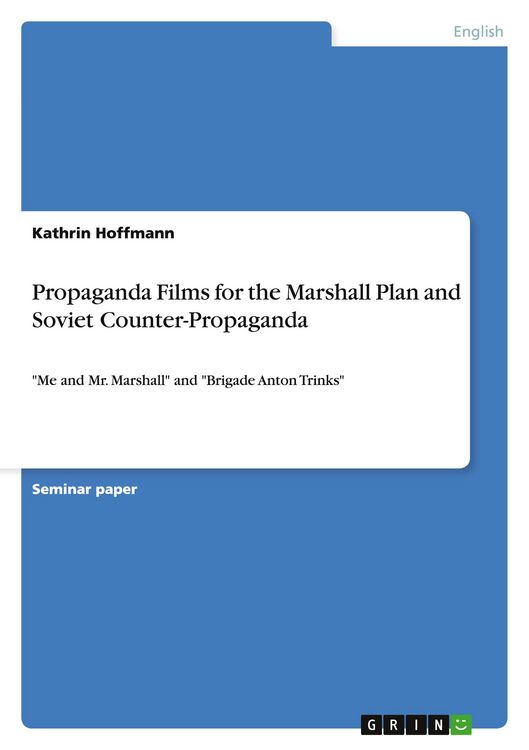Seminar paper from the year 2012 in the subject American Studies - Culture and Applied Geography, grade: 1,7, Free University of Berlin, language: English, abstract: In the aftermath of WW II, Europe lay in ruins ¿ cities were devastated, economies paralyzed, and the life of the population was ruled by hunger and poverty. To help Europe, the United States initiated the European Recovery Program (short ERP), commonly known under the name Marshall Plan. Named after the Secretary of State George C. Marshall, who had demanded technical and financial aid for Europe in an address at Harvard University in 1947, the plan focused on ¿help for self-help¿, providing money and goods to support the reconstruction of Europe (cf. Berlin Film Festival 2004, 8). In 1953, Marshall received the Nobel Peace Prize for his actions (cf. BFF 2005, Kosslick 4). The plan was in operation for four years, starting in April 1948. During the Marshall Plan years, the aid program was advertised in a large-scale propaganda operation through posters, brochures, exhibitions, radio programs, and films (cf. BFF 2004, Rother 7). Documentary film units were put into place throughout Europe in order to promote the plan and instill hope in European people, but also to prevent the spread of communism from the Soviet Union. Over 300 short films were produced in total, ranging from films aimed at the re-education and re-orientation in the early post-war years to films propagating the Marshall Plan. In Germany, these films were shown both commercially and non-commercially, the latterby touring units with projectors at town squares, in cultural institutions, schools, or discussion clubs (cf. Schulberg 207 ff.). As a reaction to these movies, the German Democratic Republic produced counter-propaganda films to promote Soviet ideals. All of these films had been buried in archives, e.g., in the National Archive in Washington, D.C. or in the German Federal Archive-Film Archive(cf. BFF 2004, Kosslick 4). Consequently, the films had fallen into oblivion for decades until their re-screening began in 2004, following the initiative of Sandra Schulberg, daughter of Marshall Plan film producer Stuart Schulberg (cf. BFF 2004, Kosslick 4).The Berlin Film Festivals in the years 2004 through 2006 offered three film series under the titles ¿Selling Democracy: Films of the Marshall Plan, 1947-1955,¿ ¿Winning the Peace,¿ and ¿Friendly Persuasion.¿
